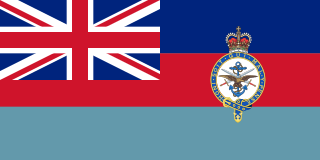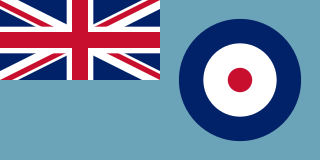
Marshal of the Royal Air Force (MRAF) is the highest rank in the Royal Air Force (RAF). In peacetime it was granted to RAF officers in the appointment of Chief of the Defence Staff (CDS), and to retired Chiefs of the Air Staff (CAS), who were promoted to it on their last day of service. While surviving Marshals of the RAF retain the rank for life, the highest rank to which officers on active service are promoted is now air chief marshal. Although general promotions to Marshal of the Royal Air Force have been discontinued since the British defence cuts of the 1990s, further promotions to the rank may still be made in wartime, for members of the Royal Family and certain very senior RAF air officers in peacetime at the discretion of the monarch; all such promotions in peacetime are only honorary, however. In 2012, the then Prince of Wales was promoted to the rank in recognition of his support for his mother, Queen Elizabeth II, in her capacity as head of the armed forces (commander-in-chief), while in 2014 Lord Stirrup, who had served as Chief of the Air Staff and Chief of the Defence Staff for over seven years, was also promoted.

The Chief of the Defence Staff (CDS) is the professional head of the British Armed Forces and the most senior uniformed military adviser to the Secretary of State for Defence and the Prime Minister of the United Kingdom. The chief of the defence staff is based at the Ministry of Defence and works alongside the Permanent Under-Secretary of State for Defence, the ministry's senior civil servant. The Chief of Defence is the highest ranking officer to currently serve in the armed forces.

The Chief of the Air Staff (CAS) is the professional head of the Royal Air Force and a member of both the Chiefs of Staff Committee and the Air Force Board. The post was created in 1918 with Major General Sir Hugh Trenchard as the first incumbent. The current and 30th Chief of the Air Staff is Air Chief Marshal Sir Richard Knighton, who succeeded Sir Michael Wigston on 2 June 2023.

Air Chief Marshal Sir James Milne Robb, was a senior Royal Air Force commander. After early service in the First World War with the Northumberland Fusiliers, Robb joined the Royal Flying Corps and became a flying ace credited with seven aerial victories. He was granted a permanent commission in the Royal Air Force in 1919 and commanded No. 30 Squadron RAF in the Iraqi revolt against the British. In 1939, Robb travelled to Canada to help establish the Empire Air Training Scheme, a massive training program that provided the Royal Air Force with trained aircrew from Canada, Australia, New Zealand and Southern Rhodesia. He commanded No. 2 Group RAF of RAF Bomber Command and No. 15 Group RAF of RAF Coastal Command.

The Air Member for Personnel (AMP) is the senior Royal Air Force officer who is responsible for personnel matters and is a member of the Air Force Board. The AMP is in charge of all aspects of recruiting, non-operational flying and ground training, career management, welfare, terms, and conditions of service, and resettlement for RAF regular, reserve, and civilian staffs worldwide.

The Deputy Chief of the Air Staff (DCAS) is a senior appointment in the Royal Air Force. The incumbent is the deputy to the Chief of the Air Staff. The post existed from 1918 to 1969, and from 2023 to present. The Deputy Chief of the Air Staff, formerly the Deputy Commander Capability, is responsible for the strategic planning and delivery of all aspects of Royal Air Force capability, including people, equipment, infrastructure, and training. The appointee is a Member of the United Kingdom's Air Force Board as the Air Member for Personnel and Capability due to their position.

Air Chief Marshal Sir Claude Bernard Raymond Pelly, was a senior commander in the Royal Air Force during the middle of the 20th century.
The Commandant-General of the RAF Regiment is the Royal Air Force commander of the RAF Regiment. The post was established in January 1942 immediately prior to the creation of the RAF Regiment. The first two holders of the post were major-generals in the British Army. From 1948 onward, the Commandant-General has been an RAF officer of air rank. These officers all held the rank of air vice-marshal until 1993 when the post was downgraded to air commodore. In 2022, the position was more upgraded to Air Vice-Marshal with the appoint of AVM Michael Smeath.

Air Chief Marshal Sir Stephen Gary George Dalton, is a retired senior officer of the Royal Air Force and former Lieutenant-Governor of Jersey.
Air Chief Marshal Sir Michael James Douglas Stear, was a senior commander of the Royal Air Force (RAF). He served as Deputy Commander in Chief, Allied Forces Central Europe from 1992 to 1996.
The British Vice-Chief of the Air Staff (VCAS) was the post occupied by the senior Royal Air Force officer who served as a senior assistant to the Chief of the Air Staff. The post was created during World War II on 22 April 1940 and its incumbent sat on the Air Council. It was abolished in 1985 when the post's responsibilities were combined with those of the Assistant Chief of the Air Staff (Policy) and the Assistant Chief of the Air Staff (Operations) to create a single post, the Assistant Chief of the Air Staff.
Air Vice Marshal Sir Matthew Brown Frew, was a Scottish First World War flying ace, credited with 23 aerial victories, who went on to serve as a senior officer in the Royal Air Force and South African Air Force during the Second World War.

No. 219 Squadron of the Royal Air Force was founded in 1918 and disbanded in 1957 after four separate periods of service. During the First World War it served as a coastal defence unit, and through most of the Second World War and the 1950s it operated as a night fighter air defence squadron. Three commanders of the squadron went on to be Chiefs of the Air Staff, two of the RAF and one of the Royal Pakistani Air Force.
Air Vice-Marshal Hugh Granville White, was a Royal Air Force air officer. He was a First World War flying ace credited with seven aerial victories, and later went on to serve throughout the Second World War, finally retiring in 1955.

The Air Secretary and Chief of Staff, Personnel is the Royal Air Force officer with responsibility for appointments, promotions, postings, and discipline of high ranking members of the British air force. From 1978 to 1983 the Air Secretary was more often referred to as "Air Officer Commanding Royal Air Force Personnel Management Centre". It is a senior RAF appointment, held by an officer holding the rank of air vice-marshal and appointed by the sovereign. The Air Secretary's counterpart in the British Army is the Military Secretary and the Royal Navy equivalent is the Naval Secretary.

Air Marshal Sir Ralph Squire Sorley, was a senior commander in the Royal Air Force (RAF). He began as a pilot in the Royal Naval Air Service during the First World War, and rose to senior command in the Second World War. After the latter he held several senior appointments until his retirement in 1948. and in 1947 was made a Commander of the Legion of Merit of the United States of America.
The Air Member for Materiel is the senior Royal Air Force officer responsible for procurement matters. The post-holder is a member of the Air Force Board and is in charge of all aspects of procurement and organisation for RAF regular, reserve and civilian staffs worldwide.

Air Vice Marshal Reginald Leonard George Marix, was a British aviator, originally with the Royal Naval Air Service, who later reached air officer rank in the Royal Air Force. He is credited with being the first pilot to destroy a Zeppelin, when in October 1914 he bombed the airship sheds at Düsseldorf. A flying accident in 1916 ended his flying career, but he remained in the Royal Air Force, serving in various staff positions, and during the Second World War commanded two reconnaissance groups, and from 1943 to 1945 the group responsible for ferrying aircraft from North America to Europe.









